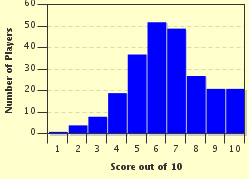Quiz Answer Key and Fun Facts
1. "Red sky at night, sailor's (or shepherd's) delight" is an old observation about the weather. Why is it true?
2. What may clouds moving against the wind indicate?
3. The old folks say "Dew on the grass, rain won't come to pass". Why is this so?
4. "Ring around the moon, rain will be approaching soon" goes the old tale. What causes the ring?
5. If a tree's leaves' undersides are on top, what does that mean?
6. Moisture-laden summer air would be responsible for which of the following old wives' tales?
7. If a lot of gulls are on the beach, what does that mean?
8. It is said that you can tell the temperature by listening to a cricket's chirping; is this true?
9. Aches and pains are said to be aggravated by coming storms. What would cause this?
10. The old maxim is "The higher the clouds the better the weather". Why would this be so?
Source: Author
CmdrK
This quiz was reviewed by FunTrivia editor
CellarDoor before going online.
Any errors found in FunTrivia content are routinely corrected through our feedback system.

